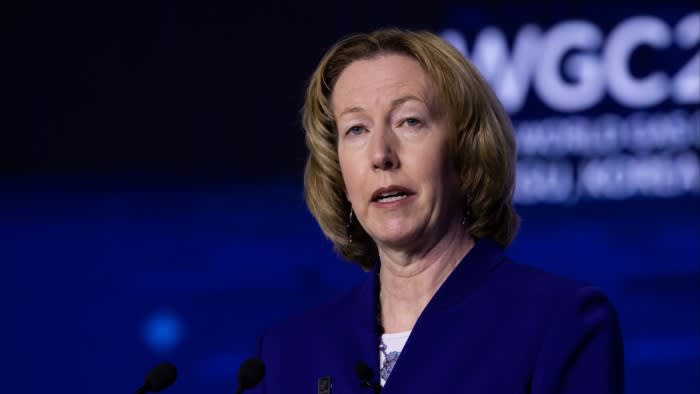Unlock the Editor’s Digest for free
Roula Khalaf, Editor of the FT, selects her favourite stories in this weekly newsletter.
Woodside Energy, the Australian company looking to transform itself into a global liquefied natural gas powerhouse, aims to build a “dream team” of investors to back its US expansion as it bets that demand for the fuel will continue to grow rapidly over the next decade.
Australia’s largest oil and gas developer announced a surprise $1.2bn takeover of struggling US LNG developer Tellurian this week, strengthening its foothold in a consolidating American energy market.
Woodside chief executive Meg O’Neill said on Tuesday she hoped to close the deal quickly, allowing the Australian company to seek outside investors for Tellurian’s development of a Louisiana export terminal.
As the Perth-based company released a second-quarter update, she told the Financial Times that recent stake sales in its large Scarborough project off the coast of Western Australia had set a precedent for its ability to bring in partners for Tellurian’s $25bn Driftwood project.
“We’ll be able to put together a dream team of partners,” she said. Japanese customers JERA and LNG Japan have acquired stakes in Scarborough, while Global Infrastructure Partners has also invested in the offshore project.
Woodside has targeted US LNG deals since its 2022 merger with BHP’s oil and gas arm, according to O’Neill. She added that the Tellurian takeover provided an opportunity for the Australian company to “control our destiny” rather than buying a minority stake in existing projects.
James Byrne, an analyst with Citi, said in a note that Woodside may face an “uphill battle” on the deal’s merits, as the price of LNG contracts has been deflating. “If this persists over the timeframe to complete the Tellurian acquisition then it may be harder to sell down from 100 per cent working interest, leaving Woodside with more equity than they might like,” he said.
O’Neill said that Woodside remains “extremely bullish” on LNG with 50 per cent growth in demand forecast over the next decade, despite the push by some countries, including Australia, to reduce fossil fuel use and development. O’Neill said she expected “tremendous demand” to continue in Asia and Europe.
However, development has become more expensive. Woodside said on Tuesday that the cost of developing Scarborough, which is two-thirds complete and due to deliver its first gas in 2026, has risen 4 per cent to $12.5bn because of design modifications needed.
O’Neill said that inflation had played a part in the cost increase but she was confident the project would be delivered at the new budget, despite some analysts predicting that the final cost could rise again. “We would not expect any further cost pressures,” she said.
Woodside shares dipped almost 3 per cent after its second-quarter update.
O’Neill also said that the Tellurian acquisition would not alter its dividend policy, despite the increased capital expenditure of developing the US project.


